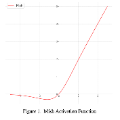Recent years have seen adversarial losses been applied to many fields. Their applications extend beyond the originally proposed generative modeling to conditional generative and discriminative settings. While prior work has proposed various output activation functions and regularization approaches, some open questions still remain unanswered. In this paper, we aim to study the following two research questions: 1) What types of output activation functions form a well-behaved adversarial loss? 2) How different combinations of output activation functions and regularization approaches perform empirically against one another? To answer the first question, we adopt the perspective of variational divergence minimization and consider an adversarial loss well-behaved if it behaves as a divergence-like measure between the data and model distributions. Using a generalized formulation for adversarial losses, we derive the necessary and sufficient conditions of a well-behaved adversarial loss. Our analysis reveals a large class of theoretically valid adversarial losses. For the second question, we propose a simple comparative framework for adversarial losses using discriminative adversarial networks. The proposed framework allows us to efficiently evaluate adversarial losses using a standard evaluation metric such as the classification accuracy. With the proposed framework, we evaluate a comprehensive set of 168 combinations of twelve output activation functions and fourteen regularization approaches on the handwritten digit classification problem to decouple their effects. Our empirical findings suggest that there is no single winning combination of output activation functions and regularization approaches across all settings. Our theoretical and empirical results may together serve as a reference for choosing or designing adversarial losses in future research.
翻译:近些年来,对许多领域都适用了对抗性损失;它们的应用范围超越了最初提议的基因模型,扩大到有条件的基因化和歧视性环境;虽然先前的工作提出了各种产出激活功能和正规化方法,但一些未决问题仍然没有得到答复;在本文件中,我们打算研究以下两个研究问题:(1) 什么样的产出激活功能构成一种良好的习惯对抗性损失?(2) 产出激活功能和正规化方法的不同组合如何在经验上相互对立?为了回答第一个问题,我们采纳了差异最小化观点,并且认为如果在数据和模式分布之间采取差异式的衡量方法,对抗性损失就会得到妥善处理。我们利用对敌对性损失的普遍表述,我们得出了一种良好习惯性对抗性损失的必要和充分条件。我们的分析揭示了一大类理论上有效的对抗性损失损失; 关于第二个问题,我们提出了一个简单的简单的比较框架,用标准的评价标准衡量标准来评价对抗性损失,例如分类准确性参照标准。 在拟议的框架中,我们共同评估了188个研究周期性结果的综合组合。



